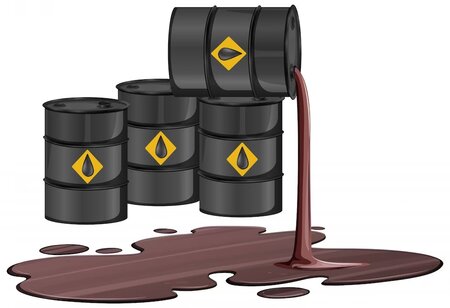
Indian crude oil imports from Russia experienced a second consecutive monthly decline in January, reaching the lowest level in the past 12 months. Despite this dip, industry data and energy cargo tracking sources suggest that India's enduring interest in Russian crude remains steadfast for the long term. In January, Russia supplied 1.2 million barrels per day (bpd) of crude oil to India, down from 1.32 million bpd in December and 1.62 million bpd in November 2023, as reported by energy cargo tracker Vortexa.
Even with the decline, Russia continues to be India's primary oil supplier, contributing to nearly a quarter of the 4.91 million bpd of oil imported by the world's third-largest energy consumer in January. The drop in Russian imports was compensated by increased sourcing from Iraq, providing 1.1 million bpd in January compared to 985,000 bpd the previous month. Meanwhile, supplies from Saudi Arabia decreased to 659,000 bpd from 668,000 bpd in December.
India heavily relies on imports for over 85% of its crude oil requirements, crucial for producing fuels such as petrol and diesel at refineries. The surge in India's demand for Russian oil began when it became available at a discount due to Western sanctions against Russia for its Ukraine invasion.
Vortexa reported that in December 2021, India only imported 36,255 bpd of crude oil from Russia, in contrast to 1.05 million bpd from Iraq and 952,625 bpd from Saudi Arabia. Although there were no Russian oil imports in the following two months, they resumed in March after the outbreak of the Ukraine war in late February. Russian imports reached a record high of 2.1 million bpd in June 2023, constituting almost 40% of India's total oil imports.
Serena Huang, Vortexa's head of APAC analysis, attributes the recent decline in Russian crude oil imports to reduced discounts compared to Middle Eastern crude, US sanctions on shipping Russian oil above a price cap, and rising tanker premiums due to Red Sea attacks. Additionally, some state refiners hurried to fulfill term commitments with Middle Eastern suppliers. The removal of sanctions on Venezuela has also reignited the interest of private Indian refiners in resuming purchases from the South American supplier.
Despite the recent fluctuation, industry officials affirm the long-term demand for Russian crude oil remains intact. The purchasing decisions of Indian companies are primarily driven by economic considerations. Indian state firms acquire Russian crude oil on a delivered basis, where the supplier arranges shipping, and the buyer pays upon oil delivery. This contrasts with Middle Eastern sourcing, where buyers cover shipping and insurance costs.
Officials emphasize that as long as the delivered cost of Russian crude oil remains economically attractive compared to other sources, Indian refiners will continue to buy. Refiners are increasingly concerned about rising shipping costs and insurance, with the US imposing sanctions on ships carrying Russian oil above a price cap set by the Group of Seven nations.
Hindustan Petroleum Corporation Ltd (HPCL) chairman Pushp Kumar Joshi stated that Russian oil accounted for 30% of the company's imports, and Bharat Petroleum Corporation Ltd (BPCL) chairman G Krishnakumar noted that 40% of the firm's crude oil imports in the December quarter came from Russia. These statements underscore the significance of Russian crude in the Indian oil import landscape, despite short-term fluctuations.

